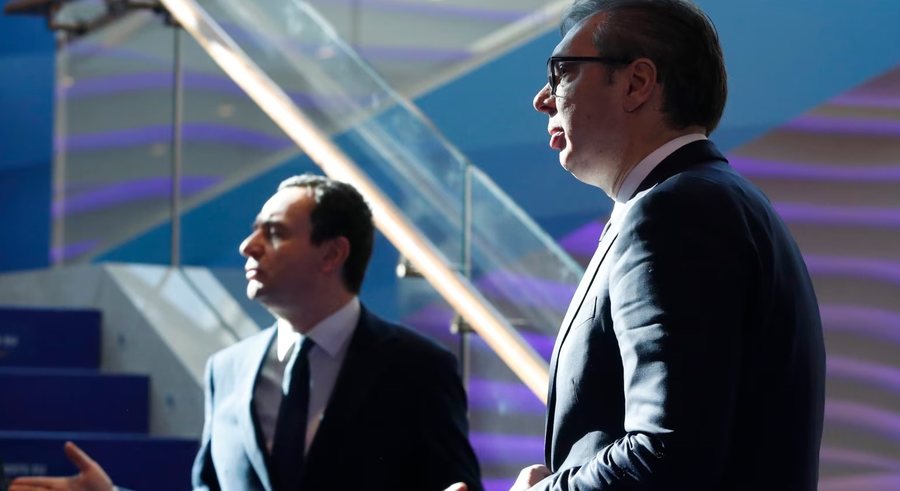
The European Union's foreign policy chief said this week that "now is the time for reengagement" by Kosovo and Serbia in the Brussels-mediated dialogue to normalize relations between the two countries.
Kaja Kallas' message, with the warning that dialogue is a necessity for them to move towards European integration, was given on the eve of her visit to the capitals of the two countries, on Wednesday and Thursday.
Later, in Belgrade, she said she plans to invite representatives from both countries to Brussels "as soon as possible" "to discuss the steps forward" - without mentioning who exactly will receive the invitation.
But, experts on political developments in Pristina and Belgrade are pessimistic about whether a return to political-level dialogue between the two countries is possible for now, A2 reports.
After the parliamentary elections of February 9, Kosovo has still not managed to complete the constitution of the Assembly, which would pave the way for the process of creating a new government.
Meanwhile, Serbia has been facing numerous protests and political turmoil in recent months.
The legitimacy of the negotiating parties
Afrim Hoti, professor of Law and International Relations at the University of Pristina, tells Radio Free Europe that dialogue is meaningless if it is not led by leaders who have credentials and legitimacy in the respective countries.
The main problem, according to him, is related to the fact that Kosovo is led by an incumbent government.
In accordance with the Constitution of Kosovo, the dialogue with Serbia is led solely by the country's government. Meanwhile, in this process, the Serbian side is led by its president.
"I do not believe that we will have a round or attempt for an eventual meeting, at least not until a new government is established in Kosovo," Hoti emphasizes.
On the other hand, after an incident in Novi Sad on November 1 last year, which claimed the lives of 16 people, authorities in Serbia faced protests for several months.
The government there, led by Miloš Vučević, resigned and was replaced by a governing cabinet currently led by Đuro Macut, who, like his predecessor, is part of the Serbian Progressive Party, founded by the current president of Serbia, Aleksandar Vučić.
Dusan Janjic, from the Belgrade Forum for Ethnic Relations, tells Radio Free Europe that developments in recent months in Serbia have seriously shaken Vucic's power.
"There is no legitimate government in Serbia, only legal ones," says Janjic, adding that the insistence of the EU High Representative for Foreign Affairs and Security Policy, Kallas, to resume the dialogue now, seems like a bureaucratic approach, with the slogan "it must start."
"It's good that [Kallas, in Belgrade and Pristina] has come, to see that the negotiators she is talking to are 'empty talk', and to start preparing her apparatus and herself for a negotiation methodology. Otherwise, she will lose her mandate as the [dialogue] facilitator," Janjic said.
The next phase of the process
On Wednesday, Vučić said that "Serbia is committed to constructive dialogue with EU mediation."
But, he added that he reminded Chief Diplomat Kallas that the formation of the Association of Serb-majority Municipalities by the Kosovo side is "a prerequisite for further progress in the dialogue."
Kosovo's readiness to participate in the dialogue process has also been expressed by President Vjosa Osmani, but she has called on the EU to, in advance, "talk about lifting the measures by the EU, because this damages the credibility of the EU itself."
The EU imposed punitive measures against Kosovo in 2023 – following rising tensions in the north of the country. Such measures remain in force.
In April, Kallas announced that the EU is addressing the mistakes in the Brussels dialogue between Kosovo and Serbia, in order to revitalize the process.
Referring to this statement, Hoti expresses the opinion that there are not many topics that can be discussed, whenever the dialogue in Brussels resumes.
According to him, the implementation of the agreements reached between the two countries remains a problem, including the main one, the Agreement on the Path to Normalization of Relations, known as the Ohrid Agreement.
"Ultimately, if we have in the background a list of agreements, for which the respective leaderships have given their consent, and we do not have their practical implementation, the continuation of the negotiation process appears unnecessary, illogical, and has no rationality," says Hoti.
He expects that Kallas' new strategy in the next phase of the dialogue will be to implement the agreements reached so far, exerting balanced pressure on both sides.
Janjic also hopes that the eventual continuation of the process, whenever it occurs during Kallas's mandate, will not be a repetition of the "conflict management" approach, as it was, according to him, during the mandate of her predecessor, Josep Borrell.
"I hope they [the EU] will think seriously and start on the path that the Americans will follow. This means: round tables, shortened negotiation processes and, most importantly, opening the 'Implementation Office'," says Janjic.
The "Implementation Office", according to him, would oversee the implementation of all agreements reached so far in the dialogue process, and would report to the EU on the results.
However, he does not expect the process to resume until the end of this year, without achieving stabilization of the circumstances and political scenes in Kosovo and Serbia./ REL (A2 Televizion)











